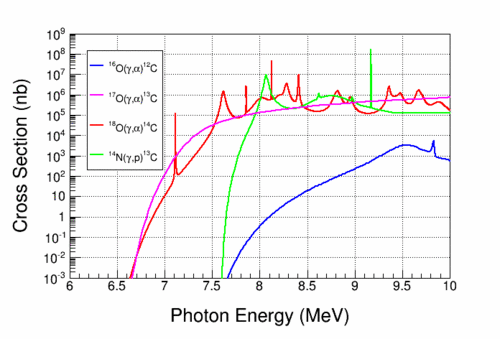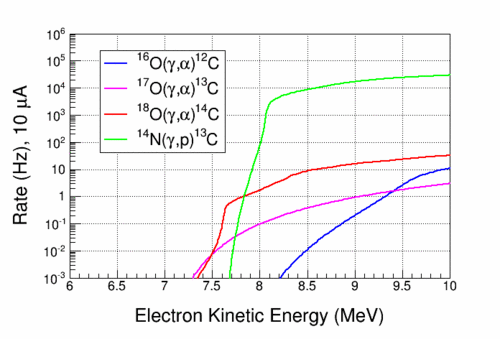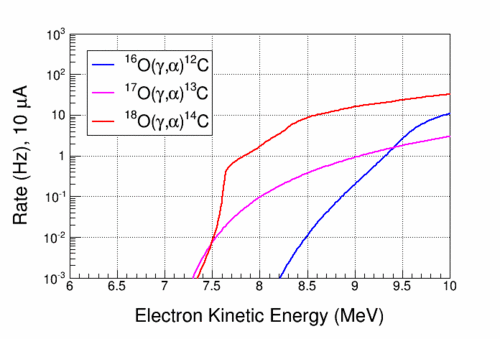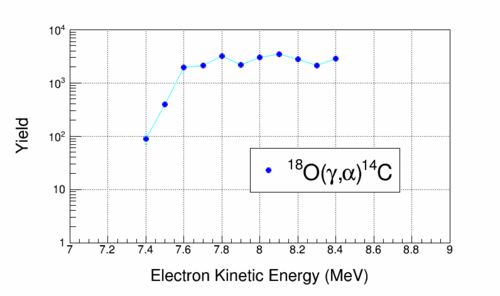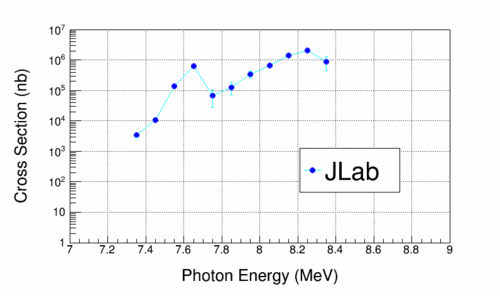Difference between revisions of "Bubble Chamber Beam Test September 2015"
| (95 intermediate revisions by 2 users not shown) | |||
| Line 1: | Line 1: | ||
| − | = ''' | + | = '''Bubble Chamber Turn On''' = |
| + | |||
| + | * '''Fill with natural N<sub>2</sub>O – test bubble chamber systems operation''' | ||
| + | |||
| + | |||
| + | * '''With beam on bubble chamber radiator:''' | ||
| + | |||
| + | # How does CCD camera perform under beam-on conditions? | ||
| + | # Count rates on bubble chamber. Do we get single or multiple bubbles from Bremsstrahlung beam exposure? | ||
| + | # Measure gamma ray beam spatial profile as reflected by bubble distribution. Is collimator effective in defining the gamma-ray beam? | ||
| + | # Test the bubble chamber laser shutter (''gumby shutter'') | ||
| + | |||
| + | |||
| + | * '''Background measurements:''' | ||
| + | |||
| + | # Measure beam off environmental background in chamber-injector area | ||
| + | # Measure beam on background by looking outside fiducial volume | ||
| + | # Measure background with beam to Faraday Cup in CEBAF beamline (about two meters from chamber) | ||
| + | # Measure neutron events in chamber. Neutron radiation detectors in injector region will indicate if any neutrons are generated (especially at beam kinetic energies higher than 8.5 MeV). | ||
| + | |||
| + | * '''Summary of Results''' | ||
| + | Report: [[media:TGT-RPT-18-002.docx]] | ||
| + | |||
| + | = '''Bubble Chamber Beam Test''' = | ||
* '''Chamber is filled with natural N<sub>2</sub>O''' | * '''Chamber is filled with natural N<sub>2</sub>O''' | ||
| − | * '''Cross sections | + | * '''Cross sections:''' |
| − | The | + | |
| + | The cross sections are shown in the following figure: | ||
| + | |||
| + | [[file:CrossSections.gif||500px|]] | ||
| + | |||
| + | * '''Expected rates:''' | ||
| − | + | The expected rates are calculated with 3 cm cell thickness and Bremsstrahlung beam from copper radiator. | |
| − | |||
* The expected rates are shown in the following figure: | * The expected rates are shown in the following figure: | ||
[[file:gNaturalN2O.gif||500px|]] | [[file:gNaturalN2O.gif||500px|]] | ||
| + | |||
| + | |||
| + | * The expected rates with the latest data are shown in the following figure: | ||
| + | |||
| + | [[file:gNaturalN2OData.gif||500px|]] | ||
| + | |||
* The expected rates from oxygen isotopes are shown in the following figure: | * The expected rates from oxygen isotopes are shown in the following figure: | ||
[[file:gNaturalO.gif||500px|]] | [[file:gNaturalO.gif||500px|]] | ||
| + | |||
| + | |||
| + | * The expected rate from <sup>14</sup>N(γ,p)<sup>13</sup>C with ThrCut = 50 keV is shown in the following figure: | ||
| + | |||
| + | [[file:g14Np_rate_ThrCut.gif||500px|]] | ||
| + | |||
| + | |||
| + | * Root macros to calculate <sup>14</sup>N(γ,p)<sup>13</sup>C with different threshold cuts (change .txt to .tar): [[media:Rate_14Ngp_ThrCut.txt]] | ||
| + | |||
| + | |||
| + | * <sup>17</sup>O(γ,n)<sup>16</sup>O cross section: | ||
| + | |||
| + | [[file:cs17Ogn_new.gif||500px|]] | ||
| + | |||
| + | |||
| + | * The expected rate from <sup>17</sup>O(γ,n)<sup>16</sup>O is shown in the following figure: | ||
| + | |||
| + | [[file:g17On_rate.gif||500px|]] | ||
| + | |||
| + | |||
| + | * The expected rate from <sup>17</sup>O(γ,n)<sup>16</sup>O with ThrCut = 130 keV is shown in the following figure: | ||
| + | |||
| + | [[file:g17On_rate_ThrCut.gif||500px|]] | ||
| + | |||
| + | |||
| + | * Root macros to calculate <sup>17</sup>O(γ,n)<sup>16</sup>O with different threshold cuts (change .txt to .tar): [[media:Rate_17Ogn_ThrCut.txt]] | ||
| + | |||
| + | |||
| + | |||
| + | ---- | ||
| + | |||
| + | |||
| + | |||
| + | <span style="font-size:150%"> '''Run Plan:''' </span> | ||
| + | |||
| + | |||
| + | * ''Check if Bubble Chamber is working properly:'' | ||
| + | # Start with K.E. of 7.7 MeV | ||
| + | # Determine the initial operational pressure and temperature | ||
| + | # Measure bubble rate. The expected rate is 1 bubble per sec at 10 µA | ||
| + | # Measure rate vs beam current (0.01, 0.1 and 1.0 µA) | ||
| + | # Measure the number of bubbles for 30 minutes per beam current | ||
| + | |||
| + | |||
| + | * ''Suppression of <sup>14</sup>N(γ,p)<sup>13</sup>C events:'' | ||
| + | |||
| + | # Start with beam at K.E. 7.0 MeV | ||
| + | # Increase beam K.E. by 0.2 MeV steps all the way to 8.6 MeV | ||
| + | # Adjust beam current to maintain a bubble rate of few per minute | ||
| + | # Measure the number of bubbles for 30 minutes per energy | ||
| + | # Reproduce the overall rate shown above | ||
| + | # At K.E. of 8.6 MeV, increase the chamber threshold by increasing the pressure. Suppress the <sup>14</sup>N(γ,p)<sup>13</sup>C events. | ||
| + | # Once <sup>14</sup>N(γ,p)<sup>13</sup>C is suppressed, the rate should drop by three orders of magnitude | ||
| + | |||
| + | |||
| + | * ''Measuring rates from <sup>18</sup>O(γ,α)<sup>14</sup>C:'' | ||
| + | |||
| + | # Now the chamber is at the new pressure | ||
| + | # Start with beam at K.E. 7.2 MeV | ||
| + | # Increase beam K.E. by 0.2 MeV steps all the way to 9.2 MeV | ||
| + | # Adjust beam current to maintain a bubble rate of few per minute | ||
| + | # Measure the number of bubbles for 30 minutes per energy | ||
| + | # Reproduce the overall rate from oxygen isotopes shown above | ||
| + | # Note the change in slope of rates vs. beam K.E. and the sharp kink around 7.6 MeV | ||
| + | |||
| + | |||
| + | * ''Measuring <sup>18</sup>O(γ,α)<sup>14</sup>C cross section:'' | ||
| + | |||
| + | # Start with beam at K.E. 7.4 MeV | ||
| + | # Increase beam K.E. by 0.1 MeV steps all the way to 8.4 MeV | ||
| + | # Adjust beam current to maintain a bubble rate of few per minute | ||
| + | # Perform Penfold-Leiss unfolding | ||
| + | |||
| + | |||
| + | {| class="wikitable" | ||
| + | |- | ||
| + | | '''Beam Kinetic Energy (MeV)''' | ||
| + | | '''Beam Current (µA)''' | ||
| + | | '''Time (hour)''' | ||
| + | |- | ||
| + | | 7.4 | ||
| + | | 10 | ||
| + | | 10 | ||
| + | |- | ||
| + | | 7.5 | ||
| + | | 10 | ||
| + | | 10 | ||
| + | |- | ||
| + | | 7.6 | ||
| + | | 10 | ||
| + | | 5 | ||
| + | |- | ||
| + | | 7.7 | ||
| + | | 2 | ||
| + | | 5 | ||
| + | |- | ||
| + | | 7.8 | ||
| + | | 2 | ||
| + | | 5 | ||
| + | |- | ||
| + | | 7.9 | ||
| + | | 1 | ||
| + | | 5 | ||
| + | |- | ||
| + | | 8.0 | ||
| + | | 1 | ||
| + | | 5 | ||
| + | |- | ||
| + | | 8.1 | ||
| + | | 0.8 | ||
| + | | 5 | ||
| + | |- | ||
| + | | 8.2 | ||
| + | | 0.4 | ||
| + | | 5 | ||
| + | |- | ||
| + | | 8.3 | ||
| + | | 0.2 | ||
| + | | 5 | ||
| + | |- | ||
| + | | 8.4 | ||
| + | | 0.2 | ||
| + | | 5 | ||
| + | |} | ||
| + | |||
| + | |||
| + | The expected yield (counts) is shown in the following figure: | ||
| + | |||
| + | [[file:csO18_Yield_Brem_bg.gif||500px|]] | ||
| + | |||
| + | |||
| + | The Penfold-Leiss unfolded cross section is shown in the following figure: | ||
| + | |||
| + | [[file:csO18_Brem_Unfold_bg.gif||500px|]] | ||
| + | |||
| + | * Root macro files used to generate the figures above (change .txt to .tar): [[media:BubbleTest_Sept.txt]] | ||
| + | |||
| + | = '''Analysis Files''' = | ||
| + | |||
| + | * '''Presentations''' | ||
| + | |||
| + | * MCC 8 am presentation: [[media:FirstTests.pdf]] [[media:FirstTests.pptx]] | ||
| + | |||
| + | * Filling Chamber with nitrous oxide: Movie [https://drive.google.com/file/d/0B9ShTslvnOaCeFplbDU5NjZTSWs/view?usp=sharing] | ||
| + | |||
| + | * MCC 8 am movie first event: [[media:FirstBubble.gif]] | ||
| + | |||
| + | * September 12, 2015 Morning work: [[media:sept12morning.png]] | ||
| + | |||
| + | * September 12, 2015 Morning work: [[media:corrected.png]] | ||
| + | |||
| + | * Events in fiducial volume: [[media:comp.png]] | ||
| + | |||
| + | |||
| + | |||
| + | * '''Beam Current:''' | ||
| + | |||
| + | The following command dumps the archived current readback (-A) from Keithley Picoammeter K6485 to a file: | ||
| + | |||
| + | mySampler -b "2015-09-10 18:00:00" -s 1s -n 14400 IFY5D04K6485dataRead > BubbleCur_Sept10.txt | ||
| + | |||
| + | * Data file of beam current on Bubble Chamber Faraday Cup or Radiator/Dump (September 10, 18:00 - 22:00): [[media:BubbleCur_Sept10.txt]] | ||
| + | |||
| + | * Data file of beam current on Bubble Chamber Radiator/Dump (September 11, 17:00 - 24:00): [[media:BubbleCur_Sept11.txt]] | ||
| + | |||
| + | * Data file of beam current on Bubble Chamber Radiator/Dump (September 12, 9:00 - 24:00): [[media:BubbleCur_Sept12.txt]] | ||
| + | |||
| + | * Data file of beam current on Bubble Chamber Radiator/Dump (September 13, 9:00 - 19:00): [[media:BubbleCur_Sept13.txt]] | ||
| + | |||
| + | * Data file of beam current on Bubble Chamber Radiator/Dump (September 14, 13:00 - 24:00): [[media:BubbleCur_Sept14.txt]] | ||
| + | |||
| + | |||
| + | |||
| + | The following command dumps the archived current readback from BCM0L02 Gigatronics (µA) to a file: | ||
| + | |||
| + | mySampler -b "2015-09-15 15:00:00" -s 1s -n 18000 IBC0L02Current > BubbleCur_Sept15.txt | ||
| + | |||
| + | * Data file of beam current on Bubble Chamber Radiator/Dump (September 15, 15:00 - 20:00): [[media:BubbleCur_Sept15.txt]] | ||
| + | |||
| + | * Data file of beam current on Bubble Chamber Radiator/Dump (September 16, 15:00 - 22:00): [[media:BubbleCur_Sept16.txt]] | ||
| + | |||
| + | * Data file of beam current on Bubble Chamber Radiator/Dump (September 17, 15:00 - 19:00): [[media:BubbleCur_Sept17.txt]] | ||
| + | |||
| + | |||
| + | |||
| + | * '''Beam Energy:''' | ||
| + | |||
| + | The following command dumps the archived data relevant to measuring beam energy to a file: | ||
| + | |||
| + | mySampler -b "2015-09-10 18:00:00" -s 100s -n 6912 R027GSET R027GMES R027PSET R027PMES R028GSET R028GMES R028PSET R028PMES MDL0L02.BDL MDL0L02M > BubbleEne_Sept2015.txt | ||
| + | |||
| + | * Data file for beam energy measurements (September 10, 18:00 - September 18, 18:00): [[media:BubbleEne_Sept2015.txt]] | ||
| + | |||
| + | |||
| + | |||
| + | |||
| + | = '''Logbook: List of Runs''' = | ||
| + | |||
| + | A copy of the paper logbook: [[media:Bubble_Chamber_Sept_2015_Runs_List.pdf]] | ||
| + | |||
| + | |||
| + | |||
| + | |||
| + | ='''Things To Do Next'''= | ||
| + | |||
| + | |||
| + | |||
| + | '''No Beam Checklist''' | ||
| + | * Survey and align 5D line | ||
| + | |||
| + | |||
| + | |||
| + | '''Beam Checklist''' | ||
| + | * Calibrate 0L02 BCM | ||
| + | * Quad-center 0L02, 0L02A, 5D00, 5D01 and set BPM SOFs accordingly | ||
| + | * Measure beam position directly after radiator | ||
Latest revision as of 10:54, 4 May 2018
Bubble Chamber Turn On
- Fill with natural N2O – test bubble chamber systems operation
- With beam on bubble chamber radiator:
- How does CCD camera perform under beam-on conditions?
- Count rates on bubble chamber. Do we get single or multiple bubbles from Bremsstrahlung beam exposure?
- Measure gamma ray beam spatial profile as reflected by bubble distribution. Is collimator effective in defining the gamma-ray beam?
- Test the bubble chamber laser shutter (gumby shutter)
- Background measurements:
- Measure beam off environmental background in chamber-injector area
- Measure beam on background by looking outside fiducial volume
- Measure background with beam to Faraday Cup in CEBAF beamline (about two meters from chamber)
- Measure neutron events in chamber. Neutron radiation detectors in injector region will indicate if any neutrons are generated (especially at beam kinetic energies higher than 8.5 MeV).
- Summary of Results
Report: media:TGT-RPT-18-002.docx
Bubble Chamber Beam Test
- Chamber is filled with natural N2O
- Cross sections:
The cross sections are shown in the following figure:
- Expected rates:
The expected rates are calculated with 3 cm cell thickness and Bremsstrahlung beam from copper radiator.
- The expected rates are shown in the following figure:
- The expected rates with the latest data are shown in the following figure:
- The expected rates from oxygen isotopes are shown in the following figure:
- The expected rate from 14N(γ,p)13C with ThrCut = 50 keV is shown in the following figure:
- Root macros to calculate 14N(γ,p)13C with different threshold cuts (change .txt to .tar): media:Rate_14Ngp_ThrCut.txt
- 17O(γ,n)16O cross section:
- The expected rate from 17O(γ,n)16O is shown in the following figure:
- The expected rate from 17O(γ,n)16O with ThrCut = 130 keV is shown in the following figure:
- Root macros to calculate 17O(γ,n)16O with different threshold cuts (change .txt to .tar): media:Rate_17Ogn_ThrCut.txt
Run Plan:
- Check if Bubble Chamber is working properly:
- Start with K.E. of 7.7 MeV
- Determine the initial operational pressure and temperature
- Measure bubble rate. The expected rate is 1 bubble per sec at 10 µA
- Measure rate vs beam current (0.01, 0.1 and 1.0 µA)
- Measure the number of bubbles for 30 minutes per beam current
- Suppression of 14N(γ,p)13C events:
- Start with beam at K.E. 7.0 MeV
- Increase beam K.E. by 0.2 MeV steps all the way to 8.6 MeV
- Adjust beam current to maintain a bubble rate of few per minute
- Measure the number of bubbles for 30 minutes per energy
- Reproduce the overall rate shown above
- At K.E. of 8.6 MeV, increase the chamber threshold by increasing the pressure. Suppress the 14N(γ,p)13C events.
- Once 14N(γ,p)13C is suppressed, the rate should drop by three orders of magnitude
- Measuring rates from 18O(γ,α)14C:
- Now the chamber is at the new pressure
- Start with beam at K.E. 7.2 MeV
- Increase beam K.E. by 0.2 MeV steps all the way to 9.2 MeV
- Adjust beam current to maintain a bubble rate of few per minute
- Measure the number of bubbles for 30 minutes per energy
- Reproduce the overall rate from oxygen isotopes shown above
- Note the change in slope of rates vs. beam K.E. and the sharp kink around 7.6 MeV
- Measuring 18O(γ,α)14C cross section:
- Start with beam at K.E. 7.4 MeV
- Increase beam K.E. by 0.1 MeV steps all the way to 8.4 MeV
- Adjust beam current to maintain a bubble rate of few per minute
- Perform Penfold-Leiss unfolding
| Beam Kinetic Energy (MeV) | Beam Current (µA) | Time (hour) |
| 7.4 | 10 | 10 |
| 7.5 | 10 | 10 |
| 7.6 | 10 | 5 |
| 7.7 | 2 | 5 |
| 7.8 | 2 | 5 |
| 7.9 | 1 | 5 |
| 8.0 | 1 | 5 |
| 8.1 | 0.8 | 5 |
| 8.2 | 0.4 | 5 |
| 8.3 | 0.2 | 5 |
| 8.4 | 0.2 | 5 |
The expected yield (counts) is shown in the following figure:
The Penfold-Leiss unfolded cross section is shown in the following figure:
- Root macro files used to generate the figures above (change .txt to .tar): media:BubbleTest_Sept.txt
Analysis Files
- Presentations
- MCC 8 am presentation: media:FirstTests.pdf media:FirstTests.pptx
- Filling Chamber with nitrous oxide: Movie [1]
- MCC 8 am movie first event: media:FirstBubble.gif
- September 12, 2015 Morning work: media:sept12morning.png
- September 12, 2015 Morning work: media:corrected.png
- Events in fiducial volume: media:comp.png
- Beam Current:
The following command dumps the archived current readback (-A) from Keithley Picoammeter K6485 to a file:
mySampler -b "2015-09-10 18:00:00" -s 1s -n 14400 IFY5D04K6485dataRead > BubbleCur_Sept10.txt
- Data file of beam current on Bubble Chamber Faraday Cup or Radiator/Dump (September 10, 18:00 - 22:00): media:BubbleCur_Sept10.txt
- Data file of beam current on Bubble Chamber Radiator/Dump (September 11, 17:00 - 24:00): media:BubbleCur_Sept11.txt
- Data file of beam current on Bubble Chamber Radiator/Dump (September 12, 9:00 - 24:00): media:BubbleCur_Sept12.txt
- Data file of beam current on Bubble Chamber Radiator/Dump (September 13, 9:00 - 19:00): media:BubbleCur_Sept13.txt
- Data file of beam current on Bubble Chamber Radiator/Dump (September 14, 13:00 - 24:00): media:BubbleCur_Sept14.txt
The following command dumps the archived current readback from BCM0L02 Gigatronics (µA) to a file:
mySampler -b "2015-09-15 15:00:00" -s 1s -n 18000 IBC0L02Current > BubbleCur_Sept15.txt
- Data file of beam current on Bubble Chamber Radiator/Dump (September 15, 15:00 - 20:00): media:BubbleCur_Sept15.txt
- Data file of beam current on Bubble Chamber Radiator/Dump (September 16, 15:00 - 22:00): media:BubbleCur_Sept16.txt
- Data file of beam current on Bubble Chamber Radiator/Dump (September 17, 15:00 - 19:00): media:BubbleCur_Sept17.txt
- Beam Energy:
The following command dumps the archived data relevant to measuring beam energy to a file:
mySampler -b "2015-09-10 18:00:00" -s 100s -n 6912 R027GSET R027GMES R027PSET R027PMES R028GSET R028GMES R028PSET R028PMES MDL0L02.BDL MDL0L02M > BubbleEne_Sept2015.txt
- Data file for beam energy measurements (September 10, 18:00 - September 18, 18:00): media:BubbleEne_Sept2015.txt
Logbook: List of Runs
A copy of the paper logbook: media:Bubble_Chamber_Sept_2015_Runs_List.pdf
Things To Do Next
No Beam Checklist
- Survey and align 5D line
Beam Checklist
- Calibrate 0L02 BCM
- Quad-center 0L02, 0L02A, 5D00, 5D01 and set BPM SOFs accordingly
- Measure beam position directly after radiator
